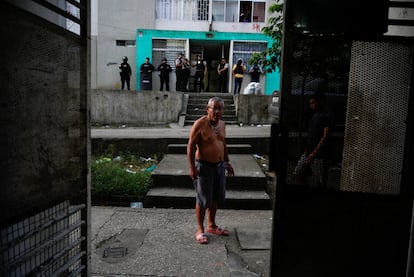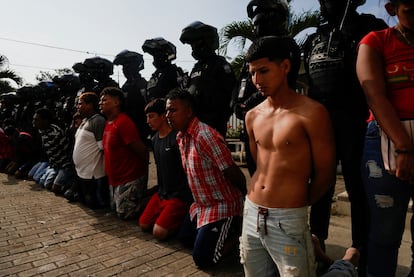Massacres return in Ecuador with 80 murders in three days
The recent killings have once again focused attention on the strategy of Daniel Noboa’s government to combat an epidemic of violence in the country

Five young men aged under 21 were gunned down last Friday in the small fishing community of Puerto López, 500 kilometers (310 miles) from the Ecuadorian capital of Quito. The following day, in the Guasmo neighborhood of Guayaquil, another 10 men were shot while playing a volleyball game. The death toll is again rising in Ecuador, where 80 violent deaths were recorded in just three days over the Easter vacation.
The series of killings that shook the country began in the early morning of Good Friday, when about 20 armed men stormed a hotel where a group of six young people and five children were staying. They were tourists vacationing over the Easter weekend. A day earlier, they had rented a car and two motorcycles and set off from Pedro Carbo, a town two hours away from Puerto López. The suspects kidnapped all 11, including the children, who were later abandoned in a nearby town. They took the six young adults to some nearby scrubland and shot them. Only one survived.
“This armed group thought they were members of another gang and that is why they killed them,” said a police intelligence source. The criminal gang operating in the area is Los Choneros, one of the two largest gangs in the country, and this was the third case involving the group in less than a year. Los Choneros shoot any unknown person who arrives in Puerto López that they consider suspicious. This is how they conduct their reign of terror amid abandonment and impunity. In this case, the police arrested two suspects and seized weapons, ammunition, and cell phones.
Puerto López is a town by the sea, where thousands of tourists embark at the port every year to watch the humpback whales that swim from the south of the continent to the Ecuadorian coast to mate. Most of the population previously worked in the fishing and tourism sectors, but many have abandoned their nets due to the extortion and threats to which they are permanently subjected. “We watched these kids grow up and now they are the ones who have us in this state of terror,” said a local resident of Puerto López.

The second massacre occurred on Saturday night in the Guasmo Sur neighborhood of Guayaquil. As is common on a weekend, the residents closed off the street, installed a net fastened from the windows of the houses in the middle of the road, and marked out a court for a volleyball game. As the teams played, children ran around, and those who were watching the match cheered the players on. A volleyball or soccer game in the street motivates people to escape the confinement of their homes; it gives them a sense of security, a feeling that nothing bad could happen. That was the atmosphere in Guasmo Sur until two gunmen arrived with AK-47 rifles and opened fire. Ten men were killed and nine others are in serious conditions in hospital.
In the midst of these two massacres, another 65 people were murdered in Ecuador over the course of three days. The killings were concentrated in the provinces of Manabí and Guayas, where 45 people died. “We cannot talk about failed containment because violent deaths increased in one weekend,” said Minister of the Interior Mónica Palencia. But the spike in violence began two weeks ago, after an apparent decrease in crime following military operations carried out under a state of emergency that allowed the army to patrol the streets. The measure was taken after 201 crimes were recorded in the first seven days of 2024, the most violent week of the year to date.
Ecuadorian President Daniel Noboa reacted Monday with the same speech he has maintained since he took office. “We will never give in to delinquency and organized crime,” he said as he witnessed the sealing up of a tunnel built by inmates at the Turi prison, in Cuenca, which was used to hide weapons and ammunition. “They can continue to threaten me every day, I am not going to stop. Likewise those threats will be returned with forceful actions,” Noboa added.
Palencia referred to a new program in which the government intends to work jointly with the municipalities, which face delayed payments and who in many cases do not have the means to finance basic works in their cities. The announcement of the new program comes as the three-month state of emergency is set to end. The military must return to barracks on April 8 and the streets will once again fall under the responsibility of the National Police.
Sign up for our weekly newsletter to get more English-language news coverage from EL PAÍS USA Edition
Tu suscripción se está usando en otro dispositivo
¿Quieres añadir otro usuario a tu suscripción?
Si continúas leyendo en este dispositivo, no se podrá leer en el otro.
FlechaTu suscripción se está usando en otro dispositivo y solo puedes acceder a EL PAÍS desde un dispositivo a la vez.
Si quieres compartir tu cuenta, cambia tu suscripción a la modalidad Premium, así podrás añadir otro usuario. Cada uno accederá con su propia cuenta de email, lo que os permitirá personalizar vuestra experiencia en EL PAÍS.
¿Tienes una suscripción de empresa? Accede aquí para contratar más cuentas.
En el caso de no saber quién está usando tu cuenta, te recomendamos cambiar tu contraseña aquí.
Si decides continuar compartiendo tu cuenta, este mensaje se mostrará en tu dispositivo y en el de la otra persona que está usando tu cuenta de forma indefinida, afectando a tu experiencia de lectura. Puedes consultar aquí los términos y condiciones de la suscripción digital.








































